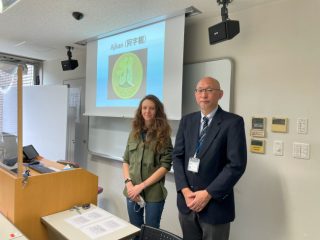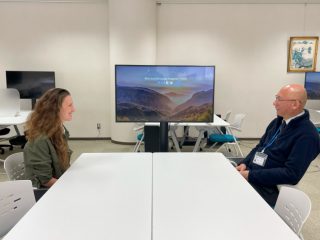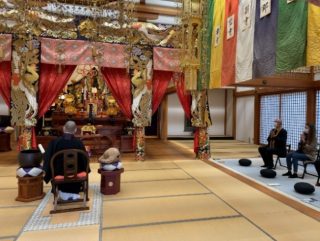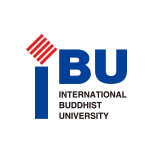News&Topics
Visitor from Warsaw University, Poland.
1st March,2023
During the spring break at the end of the academic year, 2022 (14-24, Feb.), Ms. Adrianna Karbowiak, a doctoral student at the University of Warsaw, Poland, came to Shitennoji University. She visited Prof. Atsuo Fujitani, the Senior Research Fellow at the Institute of Buddhist Cultural Studies at Shitennoji University, to deepen her understanding of Buddhism, particularly Zen and Buddhist contemplative experiences. During her stay, she had opportunities to have question-and-answer sessions with Prof. Fujitani on Buddhism. She also researched materials for her doctoral thesis in the library.
Ms. Karbowiak, Prof. Fujitani, and Assoc. Prof. Nakata paid a visit to the Shitennoji Temple complex and took part in a ritual, Shari Hoshutsu (舎利奉出) held in the Golden Hall, where Buddha’s ashes are enshrined. She also visited Sozen-ji Temple, where the former president, Prof. Soshu Nishioka resides, and received instruction in the meditation of Soto Zen. At Sozen-ji Temple, she participated in an Urasenke tea ceremony in the tearoom. She noted that she had such invaluable opportunities of experiencing Japanese culture during her short research visit to Shitennoji University.

Figure 1. Prof. Fujitani’s Lectures on Buddhist Meditation Methods

Figure 2. Discussion on the Influence of Buddhism and Zen on the Works of Contemporary Polish Writers

Figure 3. Visited the Shitennoji Temple Complex. The Heart Sutra was Recited in Polish

Figure 4. Visited Sozen-ji Temple (Soto School of Zen Buddhism)


Figure 5. Recitation of Sutras Followed by Zen Meditation Practice

Figure 6. Experienced a Tea Ceremony in the Tearoom
After returning to Poland, Ms. Karbowiak sent a message to the students of Shitennoji University.
(Reported by Kishin Nakata)
Letter for the Students of Shitennoji University
My name is Adrianna Karbowiak, and I am a PhD Student at Warsaw University in Poland. I had a pleasure and honor to do an internship at Shitennoji University under the supervision of Professor Atsuo Fujitani. My stay at the University was an intellectual adventure, and I am sure that I will never forget it. I would like to share this experience with you.
From the very first day at the University, I received a warm welcome and care. I would like to express my gratitude to everyone involved. During the internship, I had opportunities to get to know the Univeristy, to conduct library-based research, and to consult with Professor Fujitani. During my whole stay, I was impressed by the professionalism and kindness in this academic community.
By dint of question-and-answer sessions with Professor Fujitani, I was able to deepen my knowledge of Buddhist philosophy and relate it to European cultural heritage. During the session, I was also introduced to connections, influences, and differences between the Buddhist and Christian thoughts and philosophers. I believe this knowledge is crucial for further development of my doctoral thesis by deepening my understanding of the culture and philosophy that influenced the achievements of Polish modernistic writers, including Tadeusz Miciński, whose novel I am analyzing for my PhD thesis.
Apart from this academic experience, Professor Fujitani also showed me Eifuku-ji Temple and explained the very foundations of Shitennoji University. I was also granted a unique opportunity to visit Shitennoji Temple with Professor Atsuo Fujitani and Professor Kishin Nakata and was invited to participate in zazen meditation in Sozen-ji Temple, which was a great honor for me. This unique experience led me to feel the true spirit of Buddhism.
The internship at Shitennoji Univeristy was truly pleasant for me and a very valuable experience for my academic pursuits. Everything that happened to me during the internship was beyond any expectations. Once again, I would like to express my profound gratitude to Professor Fujiatni and to everyone whom I met at Shitennoji University.
P.S. For anyone who would like to explore the area of my research, I have enclosed a quote from an article by Bogusław Tracz below as a brief introduction:
In the Young Poland period, at the turn of the 19th and 20th centuries, interest in Buddhism came from the West, where it appeared in artistic and literary circles, but it was usually a secondary reception, often mixed with other religions and trends of Asian spirituality […]. In the interwar period, research on Buddhism was undertaken primarily in three university centers – in Krakow, Lviv and Warsaw, and local orientalists, among others they translated Buddhist texts from the original languages, primarily Sanskrit and Pali. In the 1930s, separate classes in philosophy and Buddhism were conducted, among others, at the University of Warsaw. Apart from the scientific reflection on the philosophical systems and religions of Asia, the popular reception of Buddhism permeated on various levels. The Polish Theosophical Society, founded on the initiative of Wanda Dynowska in Warsaw, held meetings and organized lectures popularizing various trends in Eastern spirituality, including Buddhism. [B. Tracz, Zen na poddaszu. Przyczynek do recepcji buddyzmu w Polsce, “Polska 1944/45–1989. Studia i Materiały“, XVI/2018, p. 203-204]




